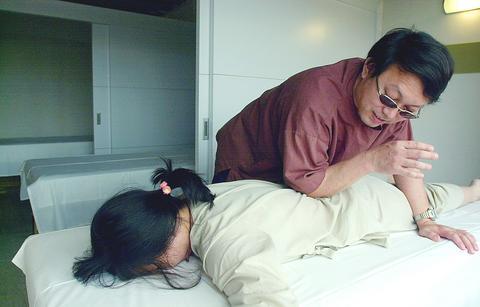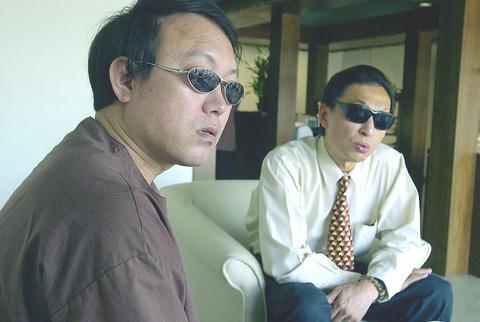Ever since Minister of the Interior Yu Cheng-hsien (余政憲) admitted that he had received massages from two unlicensed sighted masseuses, the welfare of blind masseurs has become a topical issue.
In the past blind masseurs have been associated with dark and shabby rooms with rudimentary equipment, usually little more than a simple bed.
But now, when one walks into the Blind Massage Health Center (

PHOTO: CHIANG YING-YING, TAIPEI TIMES
The center is run by the Cultural and Educational Foundation for the Blind (
A fashionable aroma permeates the air inside the center, and the relaxing light-brown color scheme is designed with a Zen minimalism calculated to attract the young urban crowd.
Three cloud-like, puffy couches in the reception area encourage visitors to relax and enjoy a good massage.

PHOTO: CHIANG YING-YING, TAIPEI TIMES
Besides traditional massages, the center also offers an oil massage, a trendy stress-relieving treat that is very popular among city-dwellers.
"When we opened our first center it did not do that well, because we mainly arranged the shop with the masseurs' convenience in mind, not that of the customers. When we realized that this caused a problem, we decided to prioritize the comfort of customers. We opened this flagship center in April, hoping to compete with the sighted masseurs for business," said Steven Chang (
"Although sighted masseurs sometimes offer better facilities, their massage skills cannot compete with ours because the blind masseurs receive long-term training, usually for two years.
"We also provide customers with a complete manual massage, while the massage services in spas and beauty salons usually make use of machines."
Chang said that, unlike the traditional blind massage shops, the center does not offer home services.
"We have this beautiful center, and of course we want people to come and enjoy the nice setting and atmosphere," he said.
The center's smart appearance and the quality service seem to be getting results. Around 700 to 800 massages are performed every month, with customers spending between NT$700 and NT$1,400 for the service.
Chang said it was already difficult for the visually impaired to survive in the competitive job market, and if the government opened up the industry to sighted masseurs, the visually impaired would face a bleak future.
Article 37 of the Disabled Protection Law (
Sighted people started campaigning for the right to work as masseurs after the scandal involving Yu.
Although Democratic Progressive Party (DPP) legislators expressed support for sighted masseurs, they dared not talk about amending the law.
One of the center's masseurs, 45-year-old Chen Lien-tsai (
"We even depend on others to get out of the door -- how can we protest for our rights?" Chen said.
Some lawyers and scholars have argued that reserving the massage industry for the visually impaired violates Article 15 of the Constitution, which protects the rights of all citizens to work.
Chen Chieh-ju (
"The special law [the Disabled Protection Law] should have priority over the Constitution to protect the rights of disadvantaged people," Chen said.
She said Taiwan has been ignoring the rights of disabled people for a long time, and that there was no other choice except using strict laws to protect their rights.
"I am not completely opposed to opening up the industry, but there has to be very strict and clear regulations on what the sighted masseurs can do, and the law has to be enforced completely to protect the blind masseurs' rights," Chen said.
Besides the Blind Massage Health Center, blind masseurs have set up service points at Taipei municipal hospitals, Taipei Railway Station and the offices of the Taipei City Government. This was achieved with help from the government, to improve the public's access to their services.
At these service points there are usually only a few chairs for the customers, but business is looking good, because customers usually have to queue.
With the help of good marketing concepts, visually impaired masseurs are no longer confined to little shops and can now expand their business.
The Taipei City Council yesterday opened a massage station staffed by blind people, and invited Yu to attend the opening ceremony.
Yu did not show up, but he did send a top-level official to say that the ministry is determined to protect the work rights of visually impaired people.
"We will not open up the massage industry to sighted people while blind people are still not guaranteed comprehensive employment opportunities in society," said Ju-na Chiu (
"Currently there are only a little more than 2,400 licensed masseurs, but there is a great demand for massage services in the community, so we will work on improving the professional training for blind people.
"At the same time, we also understand that this is not the only profession blind people can enter. According to our survey, there are now 64 professions with blind employees, but 70 percent to 80 percent of blind people are engaged in the massage business. We will also develop different jobs that are suitable for blind people," Chiu said.
According to figures provided by the Ministry of the Interior, there are about 45,000 blind people in Taiwan, of which 16,000 are old enough to work.
About 6,000 out of them are working, and just more than 2,400 are licensed masseurs.
The Blind Massage Health Center's address is: 5F, 146, Minchuan E Rd. (
Call (02) 2509-3363 for an appointment.

Alain Robert, known as the "French Spider-Man," praised Alex Honnold as exceptionally well-prepared after the US climber completed a free solo ascent of Taipei 101 yesterday. Robert said Honnold's ascent of the 508m-tall skyscraper in just more than one-and-a-half hours without using safety ropes or equipment was a remarkable achievement. "This is my life," he said in an interview conducted in French, adding that he liked the feeling of being "on the edge of danger." The 63-year-old Frenchman climbed Taipei 101 using ropes in December 2004, taking about four hours to reach the top. On a one-to-10 scale of difficulty, Robert said Taipei 101

Taiwanese and US defense groups are collaborating to introduce deployable, semi-autonomous manufacturing systems for drones and components in a boost to the nation’s supply chain resilience. Taiwan’s G-Tech Optroelectronics Corp subsidiary GTOC and the US’ Aerkomm Inc on Friday announced an agreement with fellow US-based Firestorm Lab to adopt the latter’s xCell, a technology featuring 3D printers fitted in 6.1m container units. The systems enable aerial platforms and parts to be produced in high volumes from dispersed nodes capable of rapid redeployment, to minimize the risk of enemy strikes and to meet field requirements, they said. Firestorm chief technology officer Ian Muceus said

MORE FALL: An investigation into one of Xi’s key cronies, part of a broader ‘anti-corruption’ drive, indicates that he might have a deep distrust in the military, an expert said China’s latest military purge underscores systemic risks in its shift from collective leadership to sole rule under Chinese President Xi Jinping (習近平), and could disrupt its chain of command and military capabilities, a national security official said yesterday. If decisionmaking within the Chinese Communist Party has become “irrational” under one-man rule, the Taiwan Strait and the regional situation must be approached with extreme caution, given unforeseen risks, they added. The anonymous official made the remarks as China’s Central Military Commission Vice Chairman Zhang Youxia (張又俠) and Joint Staff Department Chief of Staff Liu Zhenli (劉振立) were reportedly being investigated for suspected “serious

American climber Alex Honnold is to attempt a free climb of Taipei 101 today at 9am, with traffic closures around the skyscraper. To accommodate the climb attempt and filming, the Taipei Department of Transportation said traffic controls would be enforced around the Taipei 101 area. If weather conditions delay the climb, the restrictions would be pushed back to tomorrow. Traffic controls would be in place today from 7am to 11am around the Taipei 101 area, the department said. Songzhi Road would be fully closed in both directions between Songlian Road and Xinyi Road Sec 5, it said, adding that bidirectional traffic controls would